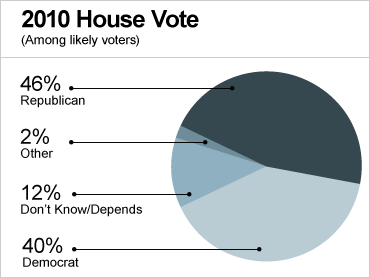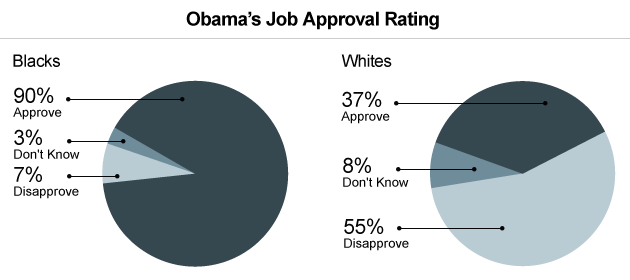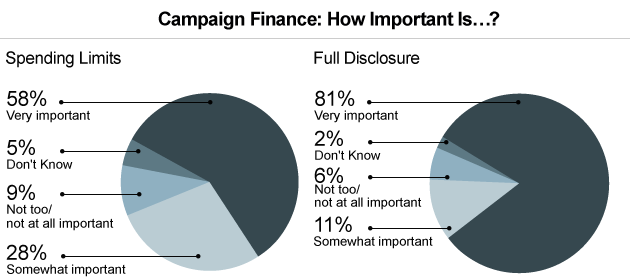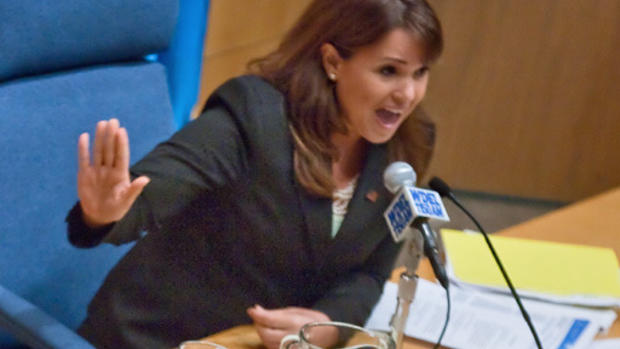Poll: Independents Drive GOP Midterm Advantage
CBS News Poll analysis by the CBS News Polling Unit: Sarah Dutton, Jennifer De Pinto, Fred Backus and Anthony Salvanto.
With the midterm elections less than a week away, a new CBS News/New York Times poll finds that Republicans continue to hold an advantage over Democrats in the generic House ballot. Forty-six percent of likely voters say they plan to vote Republican, while 40 percent say they will vote Democrat. (Learn more about how to interpret the generic House ballot here.)
The advantage can be attributed in large part to independents, who are breaking hard for the GOP. Forty-seven percent of independent likely voters say they plan to vote Republican, while just 32 percent plan to vote Democrat. Seventeen percent haven't made up their minds.
More than four in five Democrats and Republicans, meanwhile, say they are sticking with their party.
A majority of likely voters say their House vote is a referendum on President Obama, and more are voting against the president than for him. Thirty-two percent are casting a vote against Mr. Obama, while 22 percent are casting their vote to support him. Forty-two percent say their vote is about something else.
The president has been traveling the country to stump for candidates ahead of the midterms, but it may not be much help: a majority of likely voters (56 percent) say Mr. Obama's support for a candidate has no impact on their vote. And while 14 percent say Mr. Obama's support makes them more likely to back a candidate, 29 percent say it makes then less likely to do so.
Congress continues to suffer from abysmal approval ratings: Just one in ten likely voters say they approve of the job Congress is doing, and four in five say most members should be replaced.
CBS News' 2010 National House Model: What Does the National House Vote Mean?
Interactive Map: CBS News Election 2010 Race Ratings
While most likely voters say they are not more likely to cast a ballot for someone who they see as having extreme beliefs of differing views on major issues this year, nearly half say they are more willing to vote for a candidate from a different party than they usually support. In a sign that voters are fed up with Washington, 59 percent say they are more willing this year to back someone with little previous political experience.
Fifty-two percent of likely voters say they are more enthusiastic about voting this year. But the enthusiasm gap persists: Sixty-three percent of Republicans are more enthusiastic compared to 43 percent of Democrats. Thirty-one percent overall are less enthusiastic about voting this year.
As for who's voting for whom:
- Men favor Republican candidates in their House vote this year by eight points, while the Republican edge is narrower among women.
- Likely voters under age 45 are divided in their vote for Congress, while older voters are more likely to vote for Republicans.
- 77% of liberals plan to vote Democratic, but they make up just about a fifth of likely voters this year. Moderates (35% of the electorate) also edge Democratic, but conservatives, who make up four in 10 likely voters, strongly favor Republican candidates.
- Six in 10 white evangelicals and eight in 10 Tea Party supporters favor Republican candidates.
- The coalitions that voted for Barack Obama and John McCain have mostly held together for this midterm election. 76% of 2008 Obama voters plan to vote Democratic in this election, while 82% of McCain voters plan to vote Republican.
Assessments of the President:
Forty-five percent of Americans approve of the job President Obama is doing, while 47 percent disapprove. The president's approval rating has not been above 50 percent since April. Just ten percent of Republicans and 36 percent of independents approve of his performance.
As the graphic above illustrates, the president is far more popular among black Americans than whites. More on that here.
Poll Reveals Racial Divide on Opinion of Obama
Overall, 45 percent of Americans are satisfied with Mr. Obama's presidency so far, while 54 percent are disappointed. A majority of 56 percent, however, are optimistic about the next two years of Mr. Obama's presidency, while 37 percent are pessimistic.
On the economy, the top concern for voters, Mr. Obama's approval rating is 42 percent. Fifty percent disapprove of him on the issue. Fifty-three percent do not think he has a clear plan for creating jobs, and a majority says he has made little to no progress on improving the economy.
Americans are split on whether the president has made progress on making health care affordable for all, and on whether he has made progress in the war in Afghanistan. Sixty-two percent give him at least some credit for moving toward ending the war in Iraq.
First lady Michelle Obama is viewed favorably by 41 percent of Americans and unfavorably by 15 percent. Forty-one percent are undecided.
Views of the Parties and Expectations for a GOP Congress:
Americans see Republicans as more likely to reduce the deficit: 43 percent say the GOP is more likely to do so, compared to 32 percent for Democrats. On health care Democrats have the edge, with 46 percent saying Democrats are more likely to improve health care conditions compared to 28 percent for Republicans. Americans are roughly split on which party is better at creating jobs.
Overall, Democrats are viewed more positively than Republicans. Forty-six percent view Democrats favorably, while 48 percent view them unfavorably. Forty-one percent view Republicans favorably, and 52 percent view them unfavorably.
Eighty-four percent of likely voters expect Republicans in Congress to try to repeal health care reform if elected, and two in three expect them to try to make the 2001 Bush tax cuts permanent for upper income Americans. They are evenly split on whether members of the GOP will try to work with Mr. Obama.
Forty-seven percent of likely voters want the health care law to be repealed. Forty-three percent want it to stand as it is. Those who plan to vote Republican are generally those who favor repeal.
Seventy-five percent of likely voters - and 66 percent of Republicans - said that, if the GOP wins control of Congress, the party should compromise some of its positions to get things done. Seventy-one percent of all voters, and 79 percent of Republicans, said that Mr. Obama should compromise given the possibility of a GOP takeover. More on that here.
Poll: Three in Four Want Political Compromise
Campaign Finance and Social Security:
Groups with anonymous donors have poured money into the midterm elections, but Americans overwhelmingly support full disclosure of donations: Eighty-one percent call full disclosure "very important." In addition, 58 percent say it is very important that the amount of money campaigns can spend be limited.
Under current law, groups not affiliated with a candidate are able to spend unlimited amounts of money on advertisements during a political campaign. Seventy-two percent say such spending should be limited.
Fifty-seven percent of Americans, including 68 percent of those who receive Social Security, disapprove of the fact that people who receive Social Security payments will not get an increase in the amount they receive in 2011.
More than seven in ten say they oppose reducing benefits for future retirees to keep Social Security solvent, while just 23 percent favor doing so. Americans are more open to raising the retirement age: 42 percent say they favor doing so to keep the program solvent, compared to 54 percent who are opposed.
Read the Complete PollThis poll was conducted among a random sample of 1,173 adults nationwide, interviewed by telephone October 21-26, 2010. An oversample of African Americans was interviewed, for a total of 273 interviews with African Americans. Phone numbers were dialed from RDD samples of both standard land-lines and cell phones. The error due to sampling for results based on the entire sample could be plus or minus three percentage points. The sampling error could be plus or minus six percentage points for the African American sample. The error for subgroups is higher. This poll release conforms to the Standards of Disclosure of the National Council on Public Polls.




